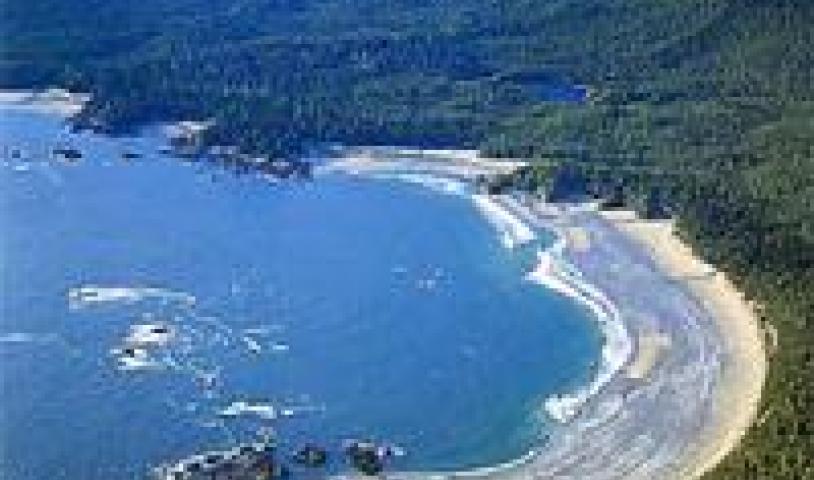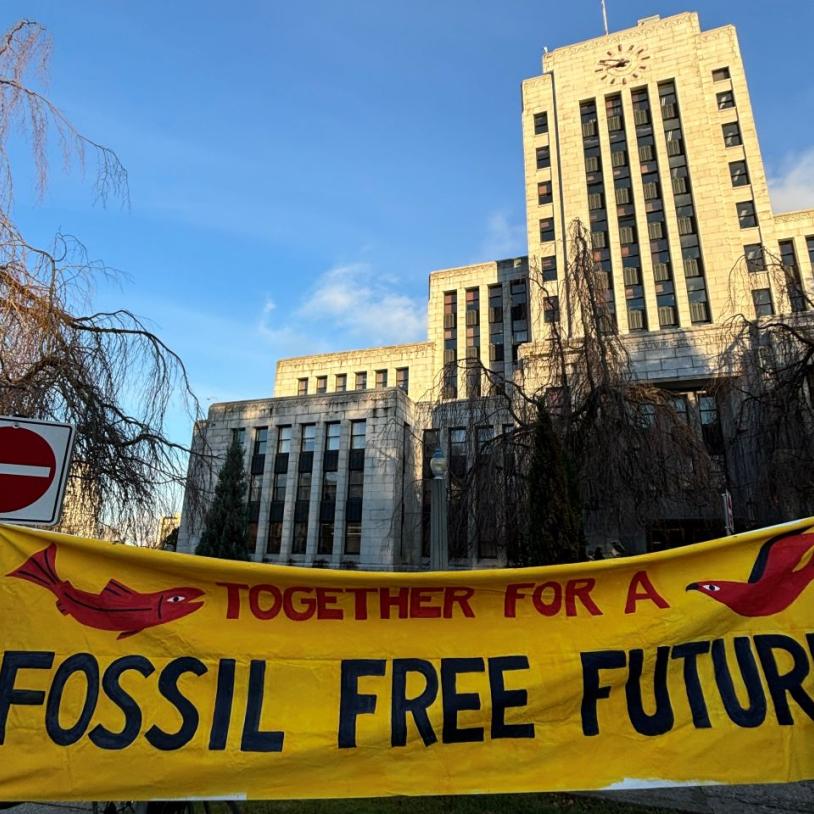Wilderness Committee to Mark BC Leadership Candidates on 'Top 11 for 2011'
Thursday, January 20, 2011
The Wilderness Committee is presenting a list of demands to all candidates for the leadership of the BC Liberals and NDP. The 'Top 11 for 2011' outlines the organization’s environmental priorities for the province.
“Instead of letting BC backslide on environmental issues, as some candidates seem eager to have us do, this is an opportunity for candidates to show their environmental credentials,” said Gwen Barlee of the Wilderness Committee. “The commitment to clean air, fresh water and wilderness should never go out of style in this province.”
The list will be presented to all declared leadership candidates in the coming days with a three week deadline for responses. The Wilderness Committee will then “mark” the responses and make the results public.
“We will be contacting all of the leadership candidates for both parties to ask them to commit to act on these crucial issues. We will be encouraging all British Columbians to do the same,” said Ben West, Healthy Communities Campaigner for the Wilderness Committee. “We consider these policy priorities to be vital for the future of a healthy and prosperous BC as well as our role in Canada and the international community,” said West.
The Wilderness Committee’s 'Top 11 for 2011' are as follows (see attached backgrounder for more details).
Top 11 Environmental Priorities for 2011
1 ) Implement a BC Endangered Species Law.
2 ) Plan to Meet GHG Targets - Expand the Carbon Tax and Shift Funding From Highways to Transit.
3 ) End Old Growth Logging and the Export of Raw Logs.
4 ) Re-Invest in BC’s Park System and Expand Protected Areas.
5 ) Ban New Coal Mines.
6 ) Restore Funding and Staffing to the Ministry of Environment.
7 ) Protect BC Rivers - Enact a Moratorium on Private Power Projects and Stop Site C.
8 ) Enact Waste Reduction Legislation.
9 ) Ban Cosmetic Pesticides from Use or Sale.
10 ) Oppose Crude Oil Tankers on the BC Coast.
11) Let the Sunshine In - Enact Whistle Blower Protection and Strengthen FOI Laws.
Backgrounder Notes
1) Implement a BC Endangered Species Law
British Columbia is one of only two provinces in Canada (the other being Alberta) with no endangered species law. BC has the most biodiversity in Canada, but has 1,900 species at risk. It’s time for BC to step up to the plate and protect our species at risk. Critically endangered species like BC’s northern spotted owl and mountain caribou will disappear from the province unless we legislate stronger on-the-ground habitat protections.
For more information: lastplaceonearth.ca
2) Provide a Plan to Meet GHG Emission Reduction Targets
BC has set aggressive targets for CO2 emission reductions yet our emissions continue to increase and current policies and investments are not putting us on track to meet these targets.
The November 2007 Greenhouse Gas Reduction Targets Act entrenched the following commitments in law: By 2020, B.C. must reduce its greenhouse gas emissions by 33 percent, compared to 2007 levels. By 2050, GHG emissions in the province must be reduced by at least 80 per cent below 2007 levels. To meet these targets the BC government must commit to continue to expand the carbon tax beyond 2012. Given that automobiles are the biggest source of emissions in the province, investments in highway infrastructure should immediately be redirected to public transit. Other priorities should include housing retrofits and improved building codes to increase energy efficiency.
For more information: wildernesscommittee.org/climate
3) End Old Growth Logging and the Export of Raw Logs.
The Wilderness Committee is calling on the BC government to ban the logging of the remaining ancient forests of BC. Other jurisdictions, including New Zealand, Thailand, Sir Lanka, Philippines and Finland have banned old-growth logging in recent years. BC must now do the same.Second-growth forests should be the sole supplier of the province's lumber mills and should be logged at a slower, more sustainable rate than they are now.
To protect the wood supply for BC's lumber mills, raw log exports to off-shore mills must be halted.
More information: wildernesscommittee.org/oldgrowth
4) Invest in BC’s Park System and Expand Protected Areas
2011 is the 100th anniversary of BC Parks. Staffing to provincial parks has been heavily cut over the past 10 years, resulting in just nine full-time permanent park rangers (additional part-time rangers are hired in the summer, but that number has been cut by over 50 per cent since 2001) responsible for patrolling almost 14 million hectares.
The BC government needs to implement the recomendations from the BC Auditor General’s recent report to help restore the ecological integrity of our park system and expand our protected area system starting with the most under-represented ecosystems and high priority areas such as expanding Manning Park. Additional steps should include doubling the provincial park budget and substantially increasing BC Park staff - particularly park rangers and park planners.
Land use plans that prioritize protection of wilderness must also be completed for regions that do not yet have them, like the Sunshine Coast and the Fraser Valley.
5) Ban New Coal Mines.
The burning of coal from BC overseas produces an equal amount of CO2 as all of BC’s own provincial emissions. The provincial government needs to commit to banning new coal mines. New mines are proposed in various regions of the province including Vancouver Island, the Peace region and the northwest.
More information: wildernesscommittee.org/coal
6 ) Restore Funding and Staffing to the Ministry of the Environment.
The Ministry of Environment has been cut by more than 50% since 2001. Funding and staffing levels need to be restored to 2001 levels as a first step towards providing proper protection and oversight of BC’s environment.
7 ) Protect BC Rivers - Enact a Moratorium on Private Power Projects and Stop Site C.
Currently, almost 800 creeks and rivers have been staked by private power companies over the past decade. Concerns regarding lack of planning, low environmental standards and the enormous financial implications to BC Hydro and BC ratepayers means an immediate moratorium on private power projects should be put in place.
The controversial Site C proposal has been on the books for years but has not been built because of its high economic and environmental costs. The dam, which would be situated just a few kilometers east of Fort St. John, would be almost a kilometer in length and would flood over 7,000 acres of Class 1 and 2 agricultural land. The reservoir would be 83 kilometers long. The Peace River region is already home to two other massive dams: the WAC Bennett Dam and the Peace Canyon Dam. Site C is not about green energy, but rather about using the electricity to power more oil and gas extraction. The government should be prioritizing energy conservation rather than proceeding with this $10 billion project.
8 ) Enact Waste Reduction Legislation.
The BC government should set aggressive targets for waste reduction. Diverting waste from landfills or incinerators creates jobs and is important for the environment. BC needs to ban compostable waste and expand recycling regulations that mandate responsibility for manufacturers to take back their product to recycle.
Currently half of BC’s landfill waste is compostable or recyclable. Organic waste in our landfill is the source of methane which is a highly potent heat-trapping green house gas. By banning compostable waste from landfills or incinerators and expanding mandated manufacturer take back recycling regulations we can eliminate methane releases and phase out the need for landfills or incinerators.
BC has some of the world's best legislation mandating that companies be responsible for the recycling of products keeping them out of landfills or incinerators. This program should be expanded.
Metro Vancouver regional district has banned compostable waste from disposal by 2015. The Capital Regional District is considering similar steps be taken on the Island. Provincial support would help make these plans a reality and provide resources to assist communities all around BC.
For more information please visit: wildernesscommittee.org/waste
9 ) Ban Cosmetic Pesticides From Use or Sale
Cosmetic pesticides have been conclusively linked to cancer and other diseases, and even though banned from use in most cities in the province they are available at the local hardware store like Canadian Tire. Already two provinces, Quebec and Ontario, and over a 150 municipalities including 24 of the biggest cities in BC, have banned cosmetic pesticides. While municipalities have the authority to pass bylaws governing pesticide use, only provincial governments have the authority to restrict pesticide sales. Which is why the BC government needs to take the next step and ban cosmetic pesticides.
For more information: wildernesscommittee.org/toxins
10) Oppose Crude Oil Tankers on BC’s Coast
BC’s good name is being spoiled by expanding the export of dirty tar sands oil. We are facing a proposal to drastically increase tanker traffic from the BC coast carrying raw heavy crude oil from Alberta to destinations throughout the Asia-Pacific. If allowed to proceed this new tanker traffic would drive massive expansions of the tar sands, a major contributor to climate change.
The world needs us to help in the transition away from fossil fuels in light of the impacts of climate change that are already being felt. Extreme weather events have more than doubled in the last ten years in the midst of the warmest decade in recorded history. Climate scientists agree that fossil fuel pollution induced climate change is speeding up desertification, flooding and other natural disasters. Meanwhile we are enabling things to get worse by encouarging instead of discouraging increased fossil fuel consumption.
Kinder Morgan has indicated that they plan on expanding exports of crude oil through the existing Trans Mountain pipeline from 2 oil tankers a week to 10 oil tankers a week all leaving from Vancouver harbour. Each tanker carrys three times more than what was spilled by the Exxon Valdez. Only since 2007 have tankers this size been allowed to carry oil through Burrard Inlet.
Also plans are underway to build the Enbridge pipeline that would bring oil from the Tar Sands to a new proposed port facility in Kitimat BC.
The BC government should oppose this expansion of Trans Mountain pipeline and oil tanker traffic in the Vancouver harbour as well as the proposed Enbridge pipeline and the associated tankers in the north coast of BC.
For more information: wildernesscommittee.org/tankers
11) Let the Sunshine In - Enact Whistle Blower Protection and Strengthen FOI Laws
A Whistleblower law would provide protection to those who disclose wrongdoing internally or externally regarding environmental crimes - essentially it provides protection for employees who take action to protect BC’s environment.
Robust Freedom of Information laws are a cornerstone of open and accountable government. Protection of the environment relies on effective FOI legislation. Once the envy of Canada, BC’s FOI laws have fallen into disrepair through a “culture of denial”. Improvements would include a renewed commitment to routine release of information, mandatory creation and archiving of government documents, penalties for destruction of records, ensuring that the public interest intent of the legislation remain paramount, and that Section 13 “advice and recommendations” exemptions do not include factual information, background reports and analysis as is currently happening.





